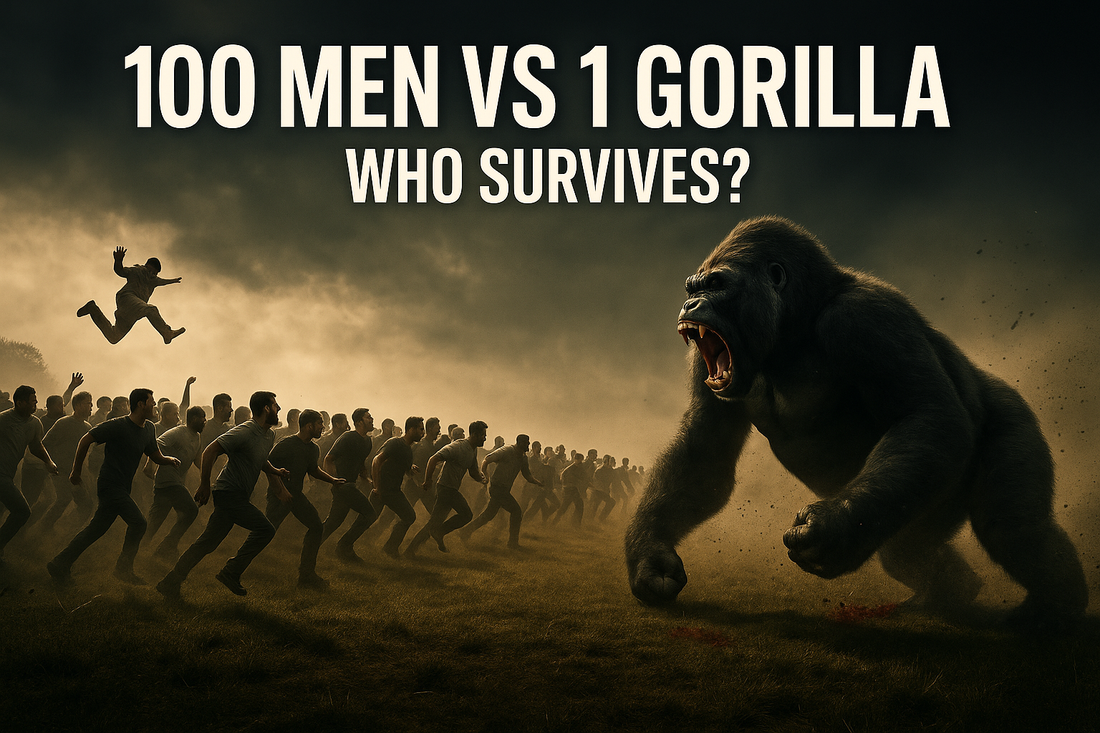
100 Men vs. 1 Gorilla: The Internet’s Wildest Hypothetical
It started like any great internet debate does: with a single question posed in a comment thread. "Who would win in a fight—100 average men or 1 adult silverback gorilla?" That sentence was all it took to launch a thousand memes, spark countless Reddit threads, and ignite a bizarre corner of online culture obsessed with hypothetical primate warfare.
As absurd as it sounds, the "100 men vs. 1 gorilla" debate taps into something deeper—our fascination with power, strategy, survival, and the limits of human potential. The idea feels like something out of a fever dream, a gladiatorial spectacle that pits sheer mass against raw animal ferocity. But what makes this scenario so sticky—what keeps it circulating through comment sections and Discord servers—is not just the entertainment value. It’s that this hypothetical forces people to confront just how fragile we really are. When stripped of weapons, technology, and structure, could human willpower and numbers actually overpower raw, primal strength?
Let’s say the battle takes place in a neutral open field. No trees for the gorilla to climb, no walls for the men to use as defense. Just grass, dirt, and the collective determination—or chaos—of a hundred unarmed humans. The silverback enters this arena not just as a beast of muscle but a biological marvel. At nearly 450 pounds, he possesses strength that could toss a full-grown man several feet into the air without effort. His bite force can crush bones. His instincts, although generally peaceful in the wild, flip like a switch when threatened.
Now let’s imagine the men. These aren’t trained soldiers or elite athletes. They’re average—your mailman, your Uber driver, the guy from accounting who plays flag football on weekends. There’s strength in numbers, sure, but only if the group acts as one. That’s the crux of the debate. The 100 men might outnumber the gorilla, but without unity, they’re just a crowd waiting to get torn apart. Fear would take over quickly. The first few seconds of the fight would be nothing but chaos: people running, tripping, panicking. A single swipe from the gorilla could incapacitate several at once. Blood would be shed instantly, and the psychological impact of watching your peers being mauled in front of you would likely lead many to flee.
But there’s another layer. Human beings are not purely instinct-driven. We have tactics, strategy, and the ability to adapt in real-time. If even a fraction of the men kept their composure, formed a plan mid-fight, and executed it with even basic coordination, the tide could shift. If 20 men rushed from one side to distract the gorilla while 80 circled and attempted to swarm him, there’s a glimmer of possibility. It wouldn’t be clean. It wouldn’t be noble. It would be a horrifying, primitive brawl. But there could be a victory—not without casualties, but perhaps with some semblance of control reclaimed from the chaos.
Now let’s look at the gorilla’s state during such an encounter. Initially calm, but when faced with encroachment and aggression, a silverback will respond with an unmatched level of violence. This isn’t a trained animal or a Hollywood creature bound by scripts. This is a wild, unpredictable force of nature capable of ending lives with a single motion. The gorilla wouldn’t fight in calculated strikes—it would explode with rage. Bone-breaking slaps, bites that puncture muscle and tendon, and the kind of intimidation that no man could reasonably stand up to. The raw speed and reflexes would be unlike anything any of those 100 men have experienced. Even a coordinated plan might dissolve the moment the gorilla starts to fight back.
There’s also the question of psychological warfare. The gorilla doesn’t need a weapon. It is a weapon. And every drop of blood spilled by its hands fuels panic. Would the men still follow the plan when faced with their friends’ mangled bodies? Would they maintain their grip and courage, or would human survival instinct override group logic? What starts as an organized effort could quickly turn into a panicked mob.
But humans are resilient. There is a spark of madness in the hypothetical that appeals to the idea of the underdog. What if these men came in knowing they would lose some, but not all? What if they committed to the idea that half of them wouldn’t make it, and the other half carried the weight of their sacrifice to win? Could a brute force tactic—sheer weight, piling on, clawing, holding—succeed in tiring the beast? There is evidence in the animal kingdom of smaller predators overwhelming larger ones through persistence and numbers. Wolves hunt prey much larger than themselves. Ants swarm and kill creatures many times their size. Is it possible that humans, in the most primal state, could mimic such behavior? Possibly. But it would take sacrifice. A lot of it.
Of course, this isn’t just a battle of bodies. It’s a battle of psychology, instinct, and identity. The 100 men, despite their average nature, might represent something more complex—humanity’s collective arrogance. We have conquered nature in so many ways. Built cities, tamed rivers, flown through the sky, and now orbit the Earth. Yet when you strip all that down to its core—one gorilla in a field against one hundred men—it’s a reset. A primitive reset. No tech. No weapons. Just flesh, fear, and a choice: run or resist.
Some argue that numbers alone would win. That the gorilla, despite its strength, would eventually be overwhelmed. Ten men grab each limb. Ten more climb its back. But how many die in the process? Would they keep going if it meant stepping over their dead friends? Would momentum be enough? Because in every mob, there's a threshold—the moment when hope fades and instinct takes over. Panic breeds collapse. The gorilla doesn’t need to kill all 100 men. It just needs to break their will.
And that’s the most terrifying part. The fight isn’t only physical—it’s psychological. Once the first few men are down, it becomes a test of courage versus terror. That’s the edge the gorilla has. Not just its strength, but its ability to create a fear so pure it unravels coordination. Could enough men press through that and pile on anyway? Maybe. But that level of resolve is rare—even in combat-trained professionals.
This is why the internet can’t let the debate go. It's not just a meme. It’s a digital myth that forces us to reexamine our place in the food chain. We want to believe that our species, through numbers and strategy, can overcome anything. That a group of average guys could bring down a living tank. It’s hope mixed with horror. Glory with a body count. A test of man against monster.
Still, if you play the odds a thousand times, the gorilla probably wins 999 of them. He doesn't get tired the same way humans do. He doesn’t hesitate. He doesn’t coordinate—but he doesn’t need to. His movements are decisive, brutal, and final. Every moment the men hesitate is a second lost—and likely a life lost. And once the panic starts, it spreads like wildfire. No battle plan survives contact with a silverback.
But if—if—those 100 men are not just average, but motivated. If they enter that field with knowledge, with practice, and with a sacrificial mindset, things might shift. A swarm tactic could work. Clothing turned into makeshift nets. People willing to take the front line knowing it means death, just so the men behind them get a better shot. A wall of flesh thrown at a singular enemy. It’s not strategy. It’s desperation.
And in that desperation lies the only sliver of victory. A fleeting chance that enough bodies can wear down the beast. It wouldn't be a clean win. It wouldn't even be a full win. But it might be just enough. Just enough for the last ten men, covered in blood, broken and breathless, to stand over the body of the fallen king of the jungle. Victors—but at what cost?
That’s what makes the scenario so compelling. Not just the absurdity of the matchup, but what it says about us. That we are dreamers, myth-makers, and survivors. And we like to think that no matter how strong the enemy, even if it’s nature itself, humanity can rise—not always gracefully, but defiantly.







